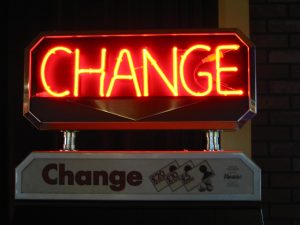Pen Pal Project
Election Day
October 19, 2015
Dear Reva,
 The fall is racing by in a blur of turkey dinners and Halloween decorations and soccer games and homework and karate lessons and puberty and literary events. And political chatter, of course, because today is the Canadian election. Have you voted yet?
The fall is racing by in a blur of turkey dinners and Halloween decorations and soccer games and homework and karate lessons and puberty and literary events. And political chatter, of course, because today is the Canadian election. Have you voted yet?
On the subject of the election, I’ve obviously aged into a new demographic in the past four years: I know a statistically significant number of people running for office. As I commute across the city every day, I see people on lawn signs that I knew in law school, or in university, or in a previous career. Other friends are holding fundraisers or running campaigns.
We’ve arrived. We are officially entering our professional power years. So, what are we going to do with them?
This was, I recall, one of the reasons we started The Pen Pal Project. I haven’t spent much time talking about my career in these pages, not because I haven’t been focused on it, but because I’m superstitious about work-in-progress, and because other life events seemed more letter-worthy. But you asked in your last letter about how I write, how I keep the threads of the story from unraveling in my head when real life is grabbing at the ends and pulling.
So it seems like the right time to mention that my second novel is due at the beginning of December, and it appears that I will hit my deadline. This means two things. First, that I am writing furiously and am displaying frequent hermit-like behavior, with an occasional exception made for the aforementioned literary events (I still feel like a fan-girl, but not like an imposter, which is progress). And second, that amid all of the personal chaos of the past year, I have managed (almost) to write a book.
It occurred to me recently that the crux of identity is in the doing. That is to say, we are what we do. I’ve spent more time than I’d care to admit over the course of my life asking the question Who am I and what is my purpose? Lately I’ve had very little time for that kind of reflection, and have been fixed on present-tense questions, such as How am I going to get through this? Different.
The interesting thing that happens when things fall apart is that your life boils down to certain essentials. You see a much smaller circle of people, you participate in a much smaller range of activities, and you engage in a narrower set of intellectual pursuits. You do not have the energy to perform. You are doing only what is essential for your survival, and it reveals an incredible amount about your identity without any effort on your part.
I’m a writer. I discovered this because even in the worst moments of my life, I kept writing. Characters pushed themselves into my imagination, and even when I was too tired to write their stories, I could still find the energy to write my own, here in these letters to you. So I’m electing to spend my power years writing. What are you going to do?
Love,
Kate


